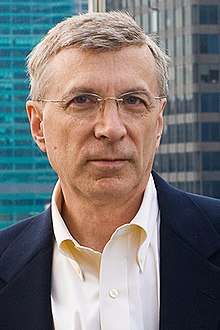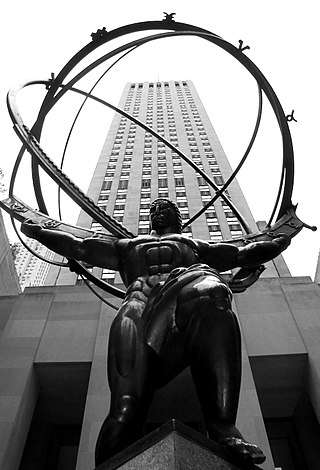Harry Binswanger
Harry Binswanger (/ˈbɪnzwæŋər/; born 1944) is an American philosopher. He is an Objectivist and a board member of the Ayn Rand Institute. He was an associate of Ayn Rand, working with her on The Ayn Rand Lexicon and helping her edit the second edition of Rand's Introduction to Objectivist Epistemology. He is the author of How We Know: Epistemology on an Objectivist Foundation (2014).
Harry Binswanger | |
|---|---|
 | |
| Born | 1944 (age 75–76) |
| Nationality | American |
| Education | Massachusetts Institute of Technology (BS) Columbia University (PhD) |
Notable work | How We Know: Epistemology on an Objectivist Foundation |
| Era | Contemporary philosophy |
| Region | Western philosophy |
| School | Objectivism |
| Institutions | Ayn Rand Institute |
| Thesis | The Biological Basis of Teleological Concepts (1990) |
| Objectivist movement |
|---|
 |
|
Philosophy |
|
Organizations |
|
Theorists |
|
Biography
Harry Binswanger was born and raised in Richmond, Virginia. He is an heir to the Binswanger Glass Company, founded in 1872 by Samuel Binswanger.[1]
In 1965, Binswanger received his Bachelor of Science in Humanities and Engineering from the Massachusetts Institute of Technology, where he was a brother of Zeta Beta Tau fraternity.[2] In 1973, he earned his Doctor of Philosophy in Philosophy from Columbia University. His dissertation was in the philosophy of biology and presented a theory of the goal-directedness of living action. It was published in 1990 as The Biological Basis of Teleological Concepts.[3] He has since taught philosophy at several universities, including the City University of New York, The New School, and the University of Texas at Austin.[4][5]
Binswanger was a friend of Ayn Rand in the final years of her life and has written his subsequent philosophical work in the tradition of Rand's Objectivist philosophy.[6] From 1980 through 1987, he published and edited a bimonthly journal called The Objectivist Forum, which was later published as a hardback collection.[7] He edited the new material in the second edition of Rand's book, Introduction to Objectivist Epistemology, published in 1990 after her death.[note 1] He also compiled The Ayn Rand Lexicon, a compilation of Rand's views on various topics.[8] His book, How We Know: Epistemology on an Objectivist Foundation, was published in 2014.
Binswanger is on the Board of Directors of the Ayn Rand Institute and is listed as a scholar at the Ayn Rand Institute Campus.[3] He also moderates and posts to a fee-based online discussion group on Objectivism, called "The Harry Binswanger Letter", which he has operated since 1998.[9] Binswanger was previously a contributor to Forbes and is currently a contributor to RealClearMarkets.[10] His television appearances have included Glenn Beck and Geraldo at Large.[11][12] He also appears in Ayn Rand: A Sense of Life, the Academy Award-nominated documentary by Michael Paxton, and Ayn Rand & the Prophecy of Atlas Shrugged, a 2011 documentary by Chris Mortensen.[13]
Views
Binswanger has been described as an "orthodox" Objectivist who is committed to ideas of his mentor Rand, whom he considers a "once in a millennium genius".[6] Binswanger expressed support for Israel on Glenn Beck and denied global warming in his Forbes column of April 3, 2013.[14] He calls for "absolutely open immigration" in a post on his website.[15]
Works
As author
- Binswanger, Harry (1990). The Biological Basis of Teleological Concepts. Los Angeles: Ayn Rand Institute Press. ISBN 0-9625336-0-2.
- Binswanger, Harry (2005). "'Free Competition' at Gunpoint". In Hull, Gary (ed.). The Abolition of Antitrust. Transaction Publishers. ISBN 0-7658-0282-1.
- Binswanger, Harry (2011). "The Dollar and the Gun". In Ralston, Richard E. (ed.). Why Businessmen Need Philosophy. Irvine, CA: Ayn Rand Institute Press. ISBN 0-9625336-2-9.
- Binswanger, Harry (2011). "Philosophy: The Ultimate CEO". In Ralston, Richard E. (ed.). Why Businessmen Need Philosophy. Irvine, CA: Ayn Rand Institute Press. ISBN 0-9625336-2-9.
- Binswanger, Harry (2014). How We Know: Epistemology on an Objectivist Foundation. New York: TOF Publications. ISBN 978-0-9856406-1-3.
As editor
- The Objectivist Forum. Vols 1–8, 1980–1987. LCCN 83-640866
- Rand, Ayn (1986). The Ayn Rand Lexicon: Objectivism from A to Z. New York: New American Library. ISBN 0-453-00528-4.
- Rand, Ayn (1990). Introduction to Objectivist Epistemology. Co-edited with Leonard Peikoff (2nd ed.). New York: Meridian. ISBN 0-453-00724-4.
Notes
- The first edition was published in 1979.
References
- Solis-Cohen, Myer (1957). The American descendants of Samuel Binswanger. Myer Solis-Cohen. ASIN B0007HGOJC.
- "Who's Who". ARIWatch.com. Retrieved September 25, 2017.
- "Harry Binswanger". AynRand.org. Retrieved September 24, 2017.
- Gotthelf, Allan & Salmieri, Gregory, eds. (2016). A Companion to Ayn Rand. Blackwell Companions to Philosophy. Chichester, United Kingdom: Wiley Blackwell. p. ix. ISBN 978-1-4051-8684-1. OCLC 932124553.
- New School Bulletin. Vol. 32 no. 5. The New School for Social Research. December 27, 1974. p. 327. Missing or empty
|title=(help) - McConnell, Scott (2010). "Harry Binswanger". 100 Voices: an Oral History of Ayn Rand. New American Library. pp. 575–611.
- Binswanger, Harry (ed.). "The Objectivist Forum".
- Binswanger, Harry. "The Ayn Rand Lexicon: Objectivism from A to Z". Ayn Rand Institute.
- Binswanger, Harry. "HBL".
- Binswanger, Harry. "Neil Gorsuch Rightly Advocates Inching Away from 'Judicial Deference'". RealClearMarkets.com. Retrieved September 25, 2017.
- https://www.youtube.com/watch?v=m2VFCyUC9N8
- "Harry Binswanger". AynRand.org. Retrieved September 26, 2017.
- Maslin, Janet. "'Ayn Rand: A Sense of Life:' A View of the Philospher (sic)". NYTimes.com. Retrieved September 25, 2017.
- Harry Binswanger (April 3, 2013). "Global Warming: Was It Just A Beautiful Dream After All?". Forbes.
- Binswanger, Harry (June 13, 2015). "For Open Immigration". TOF Publications.